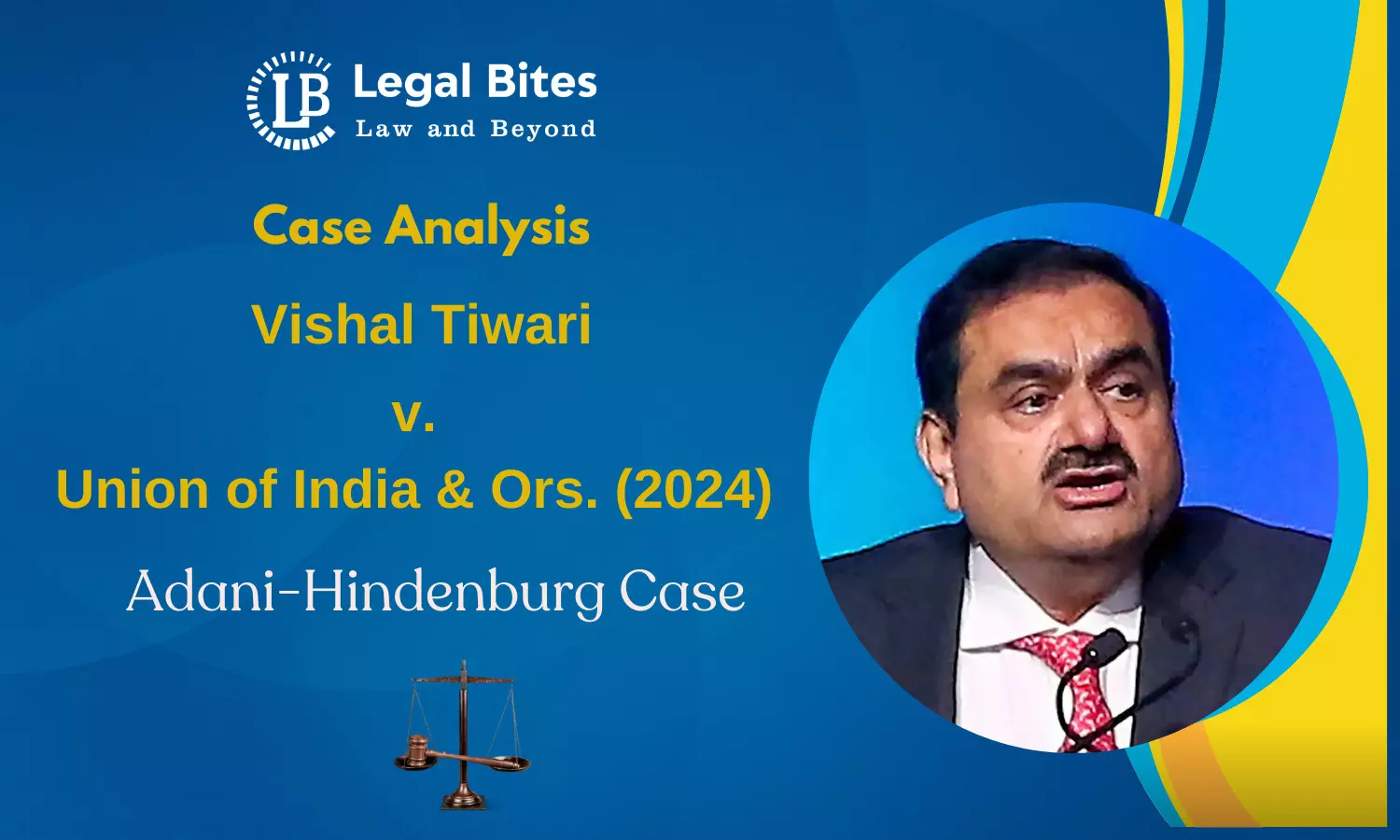Case Analysis: Vishal Tiwari v. Union of India & Ors. (2024) | Adani-Hindenburg Case
In Vishal Tiwari v. Union of India & Ors., the court shed light on possible regulatory lapses and issues pertaining to corporate governance

In Vishal Tiwari v. Union of India & Ors. (2024), popularly known as the Adani-Hindenburg Case, the court shed light on possible regulatory lapses and issues pertaining to corporate governance.
Case Title: Vishal Tiwari v. Union of India & Ors.
Court: Supreme Court of India
Citation: Writ Petition (C) No. 162 of 2023
Judges: Hon’ble CJI Dr. D.Y Chandrachud, Justice J.B Pardiwala, Justice Manoj Misra
Date of Judgment: January 03, 2024
Facts of the Case
The case was triggered by a significant decline in investor wealth and market instability following a report by Hindenburg Research on January 24, 2023, which accused the Adani Group of share price manipulation and regulatory violations. As per the report, the conditions degraded with the revelation of Hindenburg being short in position in the Adani Group. Petitioners pleaded for the formation of a committee to provide them relief.
Petitioner wanted to investigate in the context of the allegations, emphasized negligence on the part of SEBI, and blamed public sector banks in Adani Group loan disbursements. It was their plea to have a court-monitored investigation, either by a Special Investigation Team or the Central Bureau of Investigation. They also approached their plea for filing of F.I.R. against both the Hindenburg Research Founder and associates for their activities.
The primary concern of the petitions revolved around the decline in the securities market, the downfall of redressal for investors, and speculation regarding public sector banks' dealings with the Adani Group — the demand for proper investigation aimed at the protection of the investor. The petitioner highlighted the importance of transparency and accountability. The Court clarified that the Expert Committee and SEBI would work in collaboration with each other. Mr Prashant Bhushan, appearing on behalf of the petitioner broadly pressed his case for a direction to constitute an SIT to oversee the SEBI investigation into the Adani group.
This case focuses on market oversight, the requirement of proper corporate governance and investor confidence, necessitating a comprehensive examination of the allegations and regulatory responses to ensure fair and transparent market practices.
Issues
(i) Whether there can be a judicial review of SEBI's regulatory framework?
(ii) Whether the court can transfer the matter of investigation from SEBI to a Special Investigation Team (SIT)?
Laws Involved
- Rule 19A of the Securities Contracts (Regulation) Rules, 1957.
- Rule 9 of the Prevention of Money Laundering
- Securities and Exchange Board of India Act, 1992
- Articles 32 and 142 of the Constitution of India
Arguments of the Parties
Petitioner
- The Petitioner assailed SEBI’s failure to make out a prima facie case against the Adani Group for multiple grounds including non-compliance with important regulations and resulting legal violations are seen as self-inflicted restrictions.
- The Petitioner also contended that certain Foreign Portfolio Investments in the Adani Group of Stocks, which as per the investigative findings of the OCCRP (Organised Crime and Corruption Reporting Project) were facilitated primarily through two Mauritius-based funds, were violative of Rule 19A-of the Securities Contracts (Regulation) Rules, 1957.
- The Petitioner also asserted that intimations/disclaimers regarding the unethical act of price manipulation as engaged in by the Adani Group were made available by the Directorate of Revenue through a letter dated 31/01/2014, which was duly received by SEBI, yet no adequate actions were taken by it in light of the same.
- The Petitioner also stated that SEBI had wilfully delayed the submission of required reports before this Hon’ble Court.
- The Petitioner prayed for:
revocation of amendments to SEBI’s FPI policy, which is restricting not only itself but also the ED (Enforcement Directorate) and the CBDT from giving clear findings to the matters as stated,
amendments to SEBI’s Listing Obligations and Disclosure Requirements (LODR) Regulations since they altered the meaning of ‘related party’ therein.
B. Respondents
- The Respondents submitted before this Hon’ble Supreme Court that Twenty-two out of the originally assigned twenty-four investigations to SEBI have been conducted and duly completed by it.
- The Respondents urged the Court to consider that the delay by SEBI in filing the necessary reports as instructed by the Court, was only for ten additional days which was unintentional and not willful/deliberate.
- Moreover, the Respondents requested that this Court recognise the efforts made by SEBI in adopting various steps/measures as identified by the Expert Committee to improve its practices and procedures.
- The OCCRP (Organised Crime and Corruption Reporting Project) report relied on by the petitioner lacks documentary support and specific crucial/essential facts as to the source of the report, have been concealed.
- The Respondents also submitted that the amendments made to the regulatory framework in question have thereby developed the existing regulatory framework in nuanced ways which were well thought out and only then put into application.
Analysis of the Supreme Court's Decision
In the present case, the Supreme Court was compelled to scrutinise the various facts of the case in a manner unprecedented to law. The Supreme Court also witnessed jurisprudence of an unprecedented nature being utilised by the Petitioner in the said case, while challenging the amendments to regulations by SEBI and in turn called for their revocation. Diving into the details of the ruling herein reveals that there were various fundamental components to it, which are;
1. Scope of Judicial Review
Firstly, SEBI being a statute-based, executive authority by its very nature, has functions which undeniably involve regulating the financial sector, preventing the utilisation of unfair practices and securing the general interests of the public among other things. It is for such reasons that SEBI is thereby conferred with limited legislative powers in respect of drafting rules and regulations wherever necessary, to carry out these functions as entrusted to it by its parent legislation.
In the instant case, directions about both the regulatory and delegated legislative powers of SEBI are being sought by the petitioners, seeking to revoke the amendments made by it to the SEBI (Foreign Portfolio Investments) Regulations, 2014 and the SEBI (Listing Obligations and Disclosure Requirements) Regulations, 2015.
The Supreme Court also laid down the 4 grounds on which a policy framed by a specialised regulator can be subject to Judicial Review, and these include
(i) violations of the fundamental rights of the citizens;
(ii) if it is contrary to the provisions of the Constitution;
(iii) if it is opposed to a statutory provision; or
(iv) if it is manifestly arbitrary.
After scrutinising the said question of Law extensively and also taking into account the relevant judicial precedents, the Supreme Court was of the sound opinion that only the legality of the policy may be made the subject of judicial review. Assailing the wisdom of soundness of the policy is not the ulterior objective of judicial review. It was also laid down in the case that no court should engage in an interpretation of Law which results in an outcome where, the Court has supplanted the role of the experts in conducting findings and arriving at conclusions, by substitution its view with that of the experts.
Thus the prayer of the Petitioner seeking directions against SEBI for it to revoke its amendments to the FPI Regulations and LODR Regulations must fail. As a result, SEBI was ordered to complete the pending investigations preferably within three months.
2. Why wasn't the investigation transferred out of the hands of SEBI?
While forming an opinion on the said question, another question appeared before the Court which was “whether, as per the facts of the present case, the transfer of investigation from SEBI to another agency is warranted?”
Although the Supreme Court very well possesses powers under Articles 32 and 142 of the Indian Constitution to transfer the investigation from SEBI to any other investigative agency such as the CBI or a SIT (which has to be constituted by the Court) the Bench deciding the Case thought that such powers should be used after observing utmost care and caution and therefore be used sparingly in extraordinary cases.
To answer this question the Court relied on the fact that SEBI had indeed conducted a comprehensive investigation into the matters assigned to it. SEBI was entrusted with the responsibility of conducting 24 in-depth investigations of which the reports for 22 of the 24 were submitted on 14/08/2023 and the remaining 2 on 25/08/2023. The delay of 10 days in making such a submission was condoned by this Hon’ble Court.
Moreover, the Supreme Court observed that the Petitioner's Reliance on the OCCRP report and the letter by DRI is misconceived and that therefore, the Petitioner's contentions that SEBI was “lackadaisical in its investigation” did not arise out of the reference to the letter sent by the DRI in 2014.
Conclusion
On a concluding note, the Supreme Court in the said case asserted that -
(i) its power to enter the regulatory domain and question the delegated legislation powers of SEBI is limited.
(ii) that the Union Government and SEBI shall take into consideration the effective measures/guidelines as provided by the Expert Committee which is not an exhaustive list.
(iii) SEBI and the investigative agencies of the Union Government shall probe into whether the loss suffered by Indian investors due to the conduct of Hindenburg Research and any other entities in taking short positions involved any infraction of the law and if so, suitable action shall be taken.
Ultimately, the Supreme Court also stated that this Case resulted in the elevation of the nature of jurisprudence associated with Public Interest Litigations as a means to secure easy access to justice and rightfully provide ordinary citizens with an opportunity to highlight legitimate causes before this Court. However, keeping in mind how public interest litigations can be misused/incorrectly adopted, the bench of the Supreme Court also went on to lay down that in any case where petitions lack adequate research/rationale/backing and are seen to be relying on unverified and unrelated material, such litigations are deemed frivolous, counterproductive and vexatious.
Important Links

